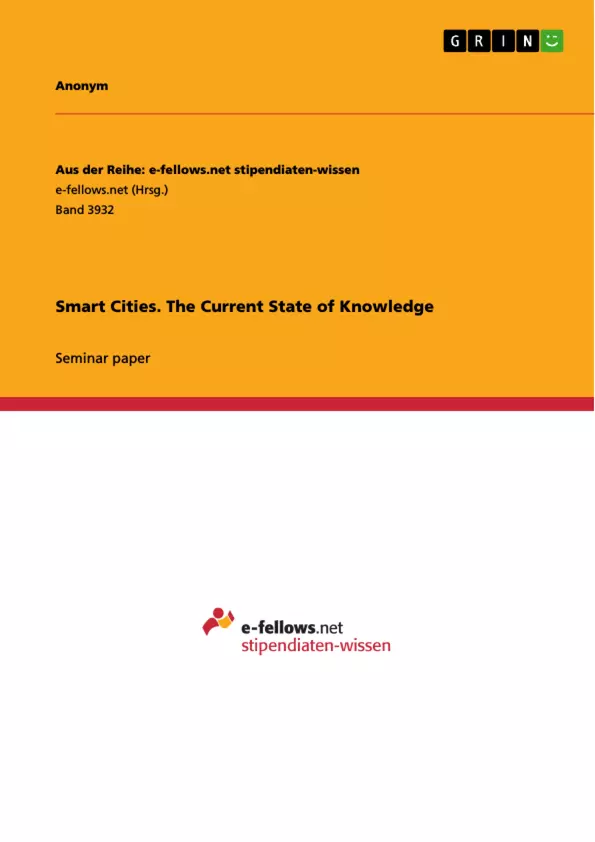As the topic of smart cities gets more current than ever and multiple smart city project examples can be identified, this seminar paper discussed the current state of knowledge of smart cities in the literature.
This paper aims to address political players and anyone who is interested in the topic of smart cities. It will be discussed what is known about smart cities, what topics are looked at mostly and what areas have not been analyzed deeply yet, so that eventually all relevant topics to look at when trying to build a smart city are written out.
First, current smart city projects are mentioned and a typical morning routine in a future smart city is shown. In the chapter of the literature search process, it will be explained that the literature search was conducted with the keywords “smart city/cities” on EBSCO, ULB and Google scholar and then checked for quality standards.
The literature review starts with analyzing the actors involved in the process of creating smart cities, showing that so far, mostly big companies push the idea of smart cities into politics and implement smart city projects together. It is assessed that integrating citizens and universities in this process to form a so-called quadruple helix would be smarter, though. This is followed by conducting a deeper research in the seven dimensions Smart Economy, Smart Mobility, Smart Governance, Smart Living, Smart People, Smart Environment, and Surveillance/Privacy. It could be analyzed that our future way of living together will consist of a lot of technology, including sensors and Artificial Intelligence. With that, smart cities will experience a new form of governance, travelling, and housing. Environmental aspects become more important than ever, being part of all dimensions, really. On the other hand, it becomes clear, that the term “smart city” is still vague and means something different to every author. Besides, psychological and privacy issues are still research gaps that need to be further analyzed. Also, it could be shown that mostly Western researchers deal with the subject of smart cities.
Inhaltsverzeichnis (Table of Contents)
- 1 Introduction
- 2 Literature Search Process
- 3 Literature Review
- 3.1 Involved Actors
- 3.2 Smart dimensions
- 3.2.1 Smart Economy
- 3.2.2 Smart Mobility
- 3.2.3 Smart Governance
- 3.2.4 Smart Living
- 3.2.5 Smart People
- 3.2.6 Smart Environment
- 3.2.7 Surveillance and privacy
- 3.3 Discussion
- 4 Identification of gaps
- 5 Conclusion
- 6 References
Zielsetzung und Themenschwerpunkte (Objectives and Key Themes)
This seminar paper analyzes the current state of knowledge regarding smart cities, examining existing projects and research to identify key aspects and gaps in understanding. It aims to provide insights for political players and anyone interested in the topic, contributing to the development of a comprehensive understanding of smart cities.
- The involvement of various actors in the development of smart cities
- The seven key dimensions of smart cities: Smart Economy, Smart Mobility, Smart Governance, Smart Living, Smart People, Smart Environment, and Surveillance/Privacy
- The role of technology, including sensors and Artificial Intelligence, in shaping urban environments
- The importance of environmental sustainability in smart city development
- The need for further research on psychological and privacy implications of smart cities
Zusammenfassung der Kapitel (Chapter Summaries)
- Introduction: The paper sets the stage by discussing the increasing prominence of smart cities and outlining its objective to provide a comprehensive review of the existing knowledge on the topic.
- Literature Search Process: This chapter describes the methodology used to conduct the literature search, including the keywords employed and the databases consulted.
- Literature Review: This section delves into the analysis of the collected literature, starting with an examination of the actors involved in creating smart cities. It then explores the seven dimensions of smart cities in detail, highlighting the role of technology, environmental considerations, and potential challenges.
- Identification of Gaps: This chapter identifies areas where further research is needed, particularly in relation to psychological and privacy concerns, as well as the diverse interpretations of the "smart city" concept.
Schlüsselwörter (Keywords)
The paper focuses on the following key concepts: smart cities, smart dimensions, technology, Artificial Intelligence, sensors, governance, mobility, living, environmental sustainability, privacy, psychological implications, research gaps.
Frequently Asked Questions
What is a Smart City?
A Smart City uses technology, sensors, and Artificial Intelligence to improve urban services, sustainability, and the quality of life for its citizens.
What are the seven key dimensions of a Smart City?
The dimensions are Smart Economy, Smart Mobility, Smart Governance, Smart Living, Smart People, Smart Environment, and Surveillance/Privacy.
Which actors are involved in creating Smart Cities?
Typically, big tech companies, political players, universities, and citizens (forming a quadruple helix) are essential for successful implementation.
What are the main research gaps regarding Smart Cities?
There is a lack of research on the psychological impact on citizens and long-term privacy issues, as well as a need for more studies from non-Western perspectives.
How does technology shape Smart Mobility?
Through real-time data, AI-driven traffic management, and integrated public transport systems that reduce congestion and environmental impact.
Why is environmental sustainability important in Smart Cities?
Sustainability is a core goal, integrated into all dimensions to manage resources efficiently and combat climate change through smart energy and waste management.
- Quote paper
- Anonym (Author), 2021, Smart Cities. The Current State of Knowledge, Munich, GRIN Verlag, https://www.hausarbeiten.de/document/1126194


